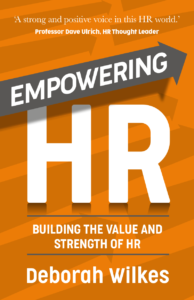Technological change has been evolving for decades, and work has evolved continuously. Artificial Intelligence, however, suddenly seems like a revolution. The workplace could, or even should, change dramatically. If you’re in HR you have a choice – play a leading role, or play catch up. Before I researched this, I thought AI was being hyped up and would take time to feed through to the workplace and therefore to HR. I was wrong. This is the biggest opportunity for HR for decades, and we need to get on the bus, at the front.
I want to share what I’ve learned about AI, the nature of the challenge, and the potential for HR:

- What is Artificial Intelligence?
- Why is it such a big thing right now?
- Why are people saying that it will change the nature of work itself?
- How could HR approach the challenge?
1. What is AI?
People are using the term very broadly, and this is because AI itself evolves. My thanks to *Jules Trocchi, Security Direction International for explaining the potential progression in his excellent presentation on AI:
- AI ‘mimics simple human intelligence’, in logical steps, eg. ‘if that, then this’ rules, building into decision trees that simulate what humans would do (without the human cognitive bias that’s particularly tricky in HR)
- ‘Machine learning’ enables computers to improve results by learning from experience; (eg. ‘my user does x when y happens, and this is a pattern I can follow’. I’ve recently heard the term ‘cobot’ – a worker’s computer gradually becomes their intelligent assistant.)
- ‘Deep learning’ mimics the deep, multi-layered neural pathways of the human brain to process all types of data at the speed of light.
2. Why is it such a big thing right now?
‘Big data + processing power = new age for AI’. *Jules Trocchi.
Data has hit critical mass. So much data is stored in ‘the cloud’ that organisations have had to work out new ways of retrieving, structuring, analysing and using it. The trend has been gathering pace for decades, however. Some of us remember when a computer beat world chess champion Garry Kasparov; he responded very positively by writing a book ‘Where machine intelligence ends and human creativity begins.’ The potential has been around for a while, but the need and the technology have now coincided. 21st Century challenges of globalisation, customer interface, security challenges, etc., are now bringing to the fore the need for massive processing capabilities. Clever organisations are also aware that this could enable human creativity to reach new heights, and leverage profitability and their competitive edge.
3. Why are people saying that it will change the nature of work itself?
First, let’s understand the nature of the change and why it’s so dramatic.
A basic principle driving the first industrial revolution was turning work into a process. This involved breaking it into component parts; discrete activities that someone could learn, speed up, maintain a set standard, and then automate. So, the principle here is linearity – work as a process. Many of our traditional HR activities reflect this – job design, work flow, organisation structure, ‘line’ management.
That’s the nub of the current work revolution. It’s about centring work around the problem, and bringing to bear the relevant strengths of human and computer in their optimum ways. In their *2017 report on AI, Deloitte pose the question: ‘What if work becomes ‘a collaborative problem-solving effort where humans define the problems, machines help find the solutions, and humans verify the acceptability of those solutions’?…..‘Might AI enable work itself to be reconstructed?’ Reconstructing work is clearly the remit of HR. Every element of work design has complex implications, from legal to welfare. Robert Bolton of KPMG raised the question of data ethics in a recent PM webinar – we’re gathering unimagined data on individual productivity, but how should we use it?
4. How could HR approach the challenge?
AI is – rapidly, or slowly, depending on your sector – going to change the nature of work itself. That’s clearly a call for HR to take the lead. But, where do we start? How do we work out what it means for our organisation? How do we position HR so that we take this unique opportunity to be out in front? Most organisations are focusing on HR systems and processes – but I believe this is just the first of 4 levels, or work streams:

It’s exciting for HR that the implications of this are, at the same time, both organisational and individual. Only HR have the reach to lead this evolution.
AI will demand a new kind of conversation at every level. If we continue to have the same kind of conversation, we continue to have the same outcomes.
a. REDESIGN HR – Leverage new technologies and reimagine roles
A key theme here is becoming more customer-centric, extending the use of HR apps; from giving employees control of, and even responsibility for, their own data; through to being a hub for services such as health support and continuous feedback and assessment. IT suppliers and global organisations are developing and trialling new approaches, and for this reason this seems to be one area where HR can get its own act together; still reaching out to key internal stakeholders, especially IT and senior leaders, but retaining relative control. It’s likely that some elements of HR will be ripe for automation, and this gives HR the opportunity to raise our game and invest more time in building the kind of relationships between HR and the business that drive productivity improvements. This could be our best ever opportunity to leave behind the work that drives us into the reactive cycle.
b. ENABLE INNOVATION – Facilitate new ways of working in discrete areas
Here we shift our focus to outside our own function; ‘We’re moving from engagement to productivity’. *Barry Flack, HR Tech expert. This is the area that holds the maximum potential for adding value to the bottom line. The outcome we want is to leverage the best contribution from human and machine, and only the people doing the work can truly work this out, with support.
How about starting with a pilot? Pick one client group, or even one team. This way you can work through the opportunities, challenges and HR implications together with the line manager. Then you can consolidate and share learning from that pilot, and move forward. Start with one area of your organisation where you can see a) potential for leveraging AI; b) one of your best relationships; c) strong sponsorship from the senior leader. How could you collaborate with them to work out operational improvements while engaging employees? Areas being talked about include knowledge transfer, and agile working with employees self-scheduling; but who knows what else could be imagined? We need to get cleverer around the questions needed’.*Barry Flack. Another post on this is coming soon.
c. LEAD CULTURE EVOLUTION – AI will accelerate cultural change
HR must play a leading role in directing positive energies, and safeguarding values
What kind of conversations are HR having with senior leaders about AI? HR can be the enablers of the most dramatic shift in ways of working for decades. Our role is to create the conditions for high performance. Agility and flexibility are key themes here, as well as empowerment – enabling individuals and teams to make the most of technology locally. This will demand new levels of courage, curiosity, ambition, and also tolerance and inclusion. I’m sure strategic consultants will try to map out a target culture and a plan to achieve it; however, because of our inability to foresee where AI could take us, we may need to learn to trust our sense of direction rather than the satnav.
d. WATCH OUT – Help the organisation to manage the inevitable risks of exploring unknown territory
 It’s a jungle out there in cyber space, and our cautionary agenda will need to embrace the whole global world of technology, commerce and human behaviour. Some commentators are predicting a downside of AI; opportunities to abuse and misuse, and employ for criminal purposes. Their warnings remind me of trying to get the toothpaste back into the tube. Arxiv* ask a fundamental question about the relative power of those exploiting AI: ‘What will be the equilibrium between attackers and defenders? ‘
It’s a jungle out there in cyber space, and our cautionary agenda will need to embrace the whole global world of technology, commerce and human behaviour. Some commentators are predicting a downside of AI; opportunities to abuse and misuse, and employ for criminal purposes. Their warnings remind me of trying to get the toothpaste back into the tube. Arxiv* ask a fundamental question about the relative power of those exploiting AI: ‘What will be the equilibrium between attackers and defenders? ‘
It is impossible to foresee where AI will lead. We cannot anticipate the implications of AI, see how much will be good or bad, or control it. One of HR’s most valued and profound responsibilities is to protect employees, as well as the business and its reputation. HR needs to build into this evolution some kind of check points or risk appraisals to protect people and values. Arxiv recommend that, in order to maintain some oversight, we ‘actively seek to expand the range of stakeholders and domain experts involved in this challenge’.
Only HR have the reach to lead this evolution
In closing this summary piece, I repeat this key belief. As always, the quality of the interaction between HR and the business will define the contribution HR can make. This is our passion at enable-hr.
Please share your thoughts on this, and your organisation’s perspective. Have you started to tackle this yet? Contact me so that I can collate the views of HR professionals, and share them with you all.
We’ve worked with leaders and managers in all functions for over 20 years so we understand the complexity of challenges such as AI across the organisation. There are some powerful techniques that can help address your own challenges. In our coaching, and in our development programmes for HRBPs and HR leaders we relate these to the particular challenges faced in HR. Our Team Workshops bring your HR Team together to re-align and re-focus. Our unique HR Profiling System enables you to evaluate how you’re operating and identify choices – self, team, 360 and whole function. Call us if you’d like to discuss further.
*Here are the links for the sources that have helped in my research, and do check out our other articles and posts about the world of HR.
Jules Trocchi, CEO Security Direction International
Deloitte 2017 report – Artificial Intelligence and the Future of Work
Arxiv report on Malicious Use of AI
KPMG 2017 report The Industry 4.0 Revolution is here
Deloitte report on Digital Maturity
Michael Alf takes a more personal view of High Performance in a Digital Age


